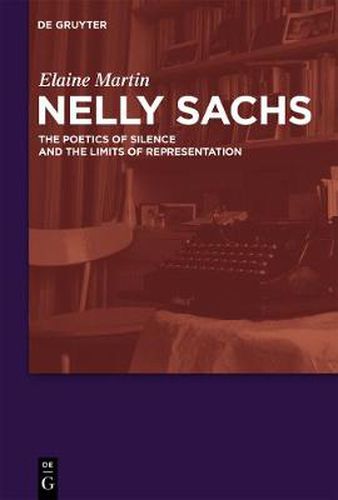Readings Newsletter
Become a Readings Member to make your shopping experience even easier.
Sign in or sign up for free!
You’re not far away from qualifying for FREE standard shipping within Australia
You’ve qualified for FREE standard shipping within Australia
The cart is loading…






This title is printed to order. This book may have been self-published. If so, we cannot guarantee the quality of the content. In the main most books will have gone through the editing process however some may not. We therefore suggest that you be aware of this before ordering this book. If in doubt check either the author or publisher’s details as we are unable to accept any returns unless they are faulty. Please contact us if you have any questions.
Nelly Sachs. The Poetics of Silence and the Limits of Representation examines the poetry of the Nobel Prize-winning German Jewish poet Nelly Sachs. It firstly shifts established patterns of reception by analysing the author’s reception in East and West Germany after the war and the role she came to play in the Federal Republic as a representative ‘Poet of Reconciliation’. The study then situates Sachs’ work within the framework of the debate surrounding the representation of the Holocaust by means of a thorough exposition of the aporia at the heart of Theodor Adorno’s writings on post-Holocaust art. It demonstrates by close reading how Sachs’ work is itself marked by this aporetic struggle and exposes in particular the aesthetic means by which Sachs renders this aporetic tension legible in her poetry through her use of, for example, prosopopoeia, her recasting of traditional metaphors and her reversal of biblical archetypes. The primary question addressed is whether Sachs’ poetry, in spite of the fact that it thematises the impossibility of adequate representation, has representational value, or whether her work is bereft of concrete, representational meaning as a result of the often fragmented nature of her writing. In particular, theauthor confronts those critics who see in Sachs’ work elements of consolation, reconciliation, or redemption in a transcendental realm, in favour of a reading that regards her work as permeated with the concrete events of the Holocaust and irreconcilably opposed to any notion of a religious sense-making and redemptive paradigm.
$9.00 standard shipping within Australia
FREE standard shipping within Australia for orders over $100.00
Express & International shipping calculated at checkout
This title is printed to order. This book may have been self-published. If so, we cannot guarantee the quality of the content. In the main most books will have gone through the editing process however some may not. We therefore suggest that you be aware of this before ordering this book. If in doubt check either the author or publisher’s details as we are unable to accept any returns unless they are faulty. Please contact us if you have any questions.
Nelly Sachs. The Poetics of Silence and the Limits of Representation examines the poetry of the Nobel Prize-winning German Jewish poet Nelly Sachs. It firstly shifts established patterns of reception by analysing the author’s reception in East and West Germany after the war and the role she came to play in the Federal Republic as a representative ‘Poet of Reconciliation’. The study then situates Sachs’ work within the framework of the debate surrounding the representation of the Holocaust by means of a thorough exposition of the aporia at the heart of Theodor Adorno’s writings on post-Holocaust art. It demonstrates by close reading how Sachs’ work is itself marked by this aporetic struggle and exposes in particular the aesthetic means by which Sachs renders this aporetic tension legible in her poetry through her use of, for example, prosopopoeia, her recasting of traditional metaphors and her reversal of biblical archetypes. The primary question addressed is whether Sachs’ poetry, in spite of the fact that it thematises the impossibility of adequate representation, has representational value, or whether her work is bereft of concrete, representational meaning as a result of the often fragmented nature of her writing. In particular, theauthor confronts those critics who see in Sachs’ work elements of consolation, reconciliation, or redemption in a transcendental realm, in favour of a reading that regards her work as permeated with the concrete events of the Holocaust and irreconcilably opposed to any notion of a religious sense-making and redemptive paradigm.